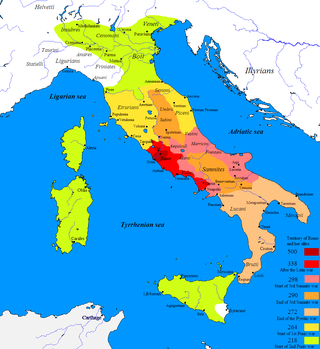This article concerns the period 69 BC – 60 BC.

The First, Second, and Third Samnite Wars were fought between the Roman Republic and the Samnites, who lived on a stretch of the Apennine Mountains south of Rome and north of the Lucanian tribe.
Appius Claudius Pulcher was a Roman noble, general and politician of the 1st century BC. He was the father of a number of renowned Romans, most notable: the infamous Clodius and Clodia.
Gaius Norbanus, nicknamed Balbus was a Roman politician who was elected consul in 83 BC alongside Lucius Cornelius Scipio Asiaticus. He committed suicide in exile at Rhodes after being proscribed by Lucius Cornelius Sulla shortly after the latter's victory in the civil war.

Lucius Minucius Esquilinus Augurinus was a Roman politician in the 5th century BC, consul in 458 BC, and decemvir in 450 BC.

The gens Cornelia was one of the greatest patrician houses at ancient Rome. For more than seven hundred years, from the early decades of the Republic to the third century AD, the Cornelii produced more eminent statesmen and generals than any other gens. At least seventy-five consuls under the Republic were members of this family, beginning with Servius Cornelius Maluginensis in 485 BC. Together with the Aemilii, Claudii, Fabii, Manlii, and Valerii, the Cornelii were almost certainly numbered among the gentes maiores, the most important and powerful families of Rome, who for centuries dominated the Republican magistracies. All of the major branches of the Cornelian gens were patrician, but there were also plebeian Cornelii, at least some of whom were descended from freedmen.

The gens Marcia, occasionally written Martia, was one of the oldest and noblest houses at ancient Rome. They claimed descent from the second and fourth Roman Kings, and the first of the Marcii appearing in the history of the Republic would seem to have been patrician; but all of the families of the Marcii known in the later Republic were plebeian. The first to obtain the consulship was Gaius Marcius Rutilus in 357 BC, only a few years after the passage of the lex Licinia Sextia opened this office to the plebeians.
Quintus Marcius Rex was a consul of the Roman Republic.
Quintus Caecilius Metellus Balearicus was a Roman statesman and general who was elected consul for the year 123 BC.
Quintus Marcius Philippus was a Roman consul in 281 BC.
Gaius Marcius Figulus was a politician of the Roman Republic who served as praetor in 169 BC, Roman consul in 162 BC, and again as consul in 156 BC. Upon being elected to the praetorship in 169 BC, Figulus received command of the Roman fleets by lot. Later that year, he transported the consul, Quintus Marcius Philippus, to Ambracia so that he could assume command of Roman forces fighting the Third Macedonian War. Figulus himself sailed on to Creusa, then crossed Boeotia by land in a single day to join the rest of the fleet at Chalcis. The only other mention Livy makes of Figulus is a reference to his having assigned part of the fleet to winter quarters at Sciathus, and the remainder at Oreum, in Euboea, which he judged the best location to maintain supply lines to the army in Macedon.
Aulus Cornelius Cossus Arvina was a Roman statesman and general who served as both consul and Magister Equitum twice, and Dictator in 322 BC.
Publius Cornelius Arvina was a Roman politician and general who lived in the late 4th century and early 3rd century BC, who served as consul of the Roman Republic twice, and as censor once.



